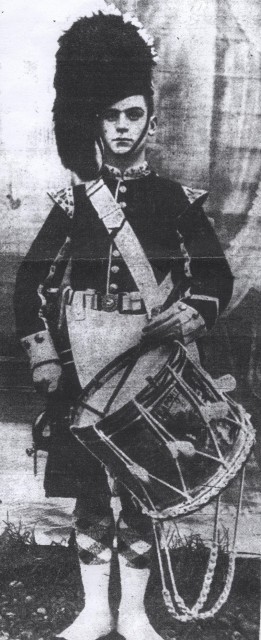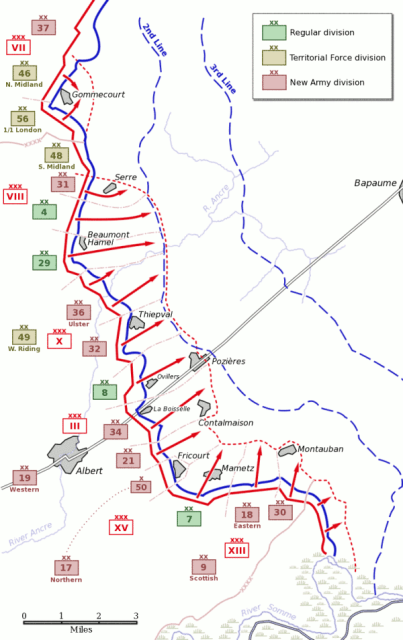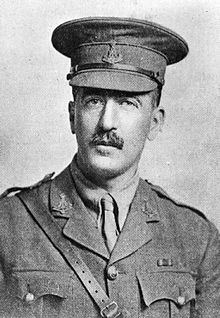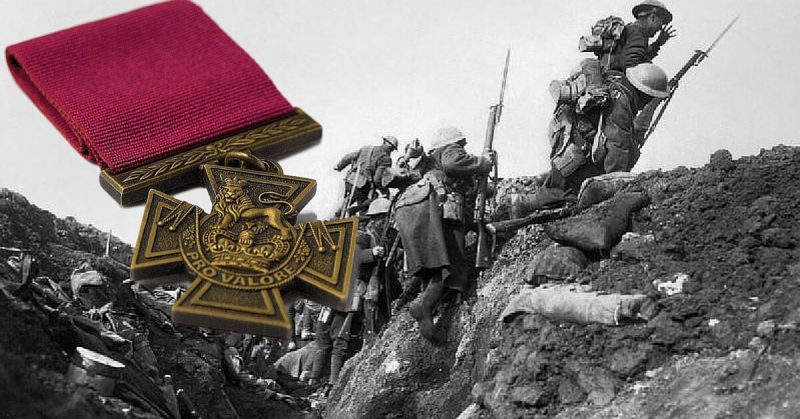In the 70 years following World War II only 15 men have been awarded the Commonwealth’s highest military honor. And yet during one five-month long battle in World War I, 49 men would receive the Victoria Cross, including nine on the very first day of the campaign.
Without a doubt, the Battle of the Somme was a stark reminder to the British people that the war that lay in store for them would be costly, bloody, and fierce. To win it would require men to march straight into the face of enemy fire and deny every mortal instinct to survive. For 20,000 British soldiers, the very first day of the battle on July 1, 1916, would be their last on planet Earth.
And yet, from the ashes of horrible conflict would come act after act of inexplicable gallantry. As the world gets ready to mark the 100 year anniversary of this terrible battle, the history of war would be remiss if it did not honor those who rose above all expectations and earned the Victoria Cross.
For the nine men who began that legacy of gallantry on July 1st, their honored place in history is soon to be commemorated.
The First Day
Truly there is no way to highlight every single act of gallantry that took place during this five-month long battle, but a good place to start is the first day. There would be nine men who would receive the Victoria Cross for their actions on the first day of the battle, only three of whom would survive to receive their medals in person.
Among the living would include the fascinating tale of the military drummer who would be awarded the Victoria Cross for playing a German bugle above all things.

During the first day of the battle, the charging British were met with a hailstorm of German machine-gun fire cutting them down in the hundreds. With most of their leaders gone, the men began to retreat until a drummer in the second Battalion of the Seaforth Highlanders wrestled a German bugle away from an enemy soldier and sounded the charge. Standing up and enemy parapet and ignoring the enemy fire, drummer Walter Ritchie was credited with rallying the men to carry on the attack and subsequently awarded the Victoria Cross for his actions.
Among the fallen to receive the Victoria Cross on the first day was a man charged not with killing, but with saving the lives of those who fought. John Leslie Green was a Captain with the Royal Army Medical Corps who continuously braved the dreaded no man’s land to bring the wounded to safety.
On one occasion, he climbed out of the trenches and spent an enormous amount of time under enemy fire untangling a wounded officer who had become enmeshed in the enemy’s wire defense. Successfully dragging him to a shell hole, he treated his wounds and then proceeded to drag the officer to safe cover. He had almost succeeded when he himself was struck down by enemy fire and died on the first day of battle.
The Battle Continues
Despite being assigned to a trench mortar battery, Captain Eric Norman Frankland Bell chose to advance with the infantry during the assault. When the assault was held up due to heavy machine gun fire, Bell crept forward just underneath the storm of bullets and shot the machine gunner dead.
He then on multiple occasions charged to the front when the advance halted and threw trench mortar bombs towards the enemy. Standing up when no man would, he fired his rifle with great effect upon the enemy as he reorganized the infantry units whose officers had been killed. It was in this action that Bell was struck and killed on July 1st while demonstrating inexplicable gallantry on route to the Victoria Cross.

Robert Quigg was an enlisted man with the Royal Irish Rifles who would participate in multiple assaults on the enemy positions during the first day of the battle. Each time they were beaten back and each time they would leave hundreds of their dead and wounded in the dreaded “no man’s land.” In the early hours of the next morning, it was reported that his platoon commander had been wounded and left on the field.
Quigg volunteered to head out into no man’s land to search for him. On seven occasions under the threat of heavy enemy fire, he set out and returned with a wounded comrade. Sadly, he never found his platoon commander and eventually collapsed from sheer exhaustion. Quigg would survive the Battle of the Somme but not before picking up a Victoria Cross for his actions that day.
Another Royal Irish Rifleman, William McFadzean would earn his Victoria Cross sacrificing his life for his fellow soldiers. When preparing trench bombs for a coming attack, the box of bombs had slipped and fallen into the trench crowded with men. Realizing that a few of the safety pins had fallen out, McFadzean launching his body on top of the bombs to protect his comrades.
The bombs exploded killing him instantly but, due to his courage and resolve, only one other man was injured. For his selfless devotion to duty and disregard for his own life, William McFadzean was awarded the Victoria Cross.
Gallantry Upon Gallantry
When James Turnbull’s unit captured a highly valued German position, Turnbull and his men found themselves under a relentless wave of counter attacks. With the rest of his unit virtually annihilated, Turnbull held the position alone in the face of an aggressive enemy. The position was held as replacements came in and Turnbull earned the Victoria Cross for his refusal to quit. Unfortunately, Turnbull was killed later that day in the continued fighting that raged around him.
Major Stewart Loudoun-Shand would fall on July 1st at the hands of the enemy as he encouraged his frightened men forward. When his Company attempted to climb over a parapet to attack the enemy trenches, they were met with a vicious storm of machine gun fire which halted the advance.
Realizing his men were terribly frightened, the Major climbed on top of the parapet himself and began pulling men up as he shouted encouragement to them. As he rallied his men, he was struck by enemy fire and yet refused evacuation. He insisted on being propped up on the trench where he continued to shout encouragement to his men before finally bleeding out.

During the chaos of the first day of battle, Corporal Sanders found himself isolated with a group of 30 men coming under heavy assault from the Germans. He rallied the men and impressed upon them that they would be holding this position at all costs.
For the next 36 hours, he led the men in the defense of the position until they were finally relieved. After being awarded the Victoria Cross for this action, Sanders would actually return to the front in 1918 where he would be awarded the Military Cross for subsequent actions before becoming a POW.
The Long Day Would Soon End
One of the final first-day recipients to fall, Geoffrey Cather spent the evening of the 1st heading out into no man’s land to rescue wounded comrades. Dragging some back to the lines and simply taking water out to others, his gallantry and disregard for his own life took place in full view of the enemy. The next morning on July 2nd he set out again to take water to the wounded before falling.
In the space of 24 hours, an unprecedented number of brave men had earned this extremely high honor. The Battle of the Somme would go down in history as one of the most brutal and costly for the British, yet the actions of the men who fought there would mark it as one of the most demonstrable feats of human courage.
